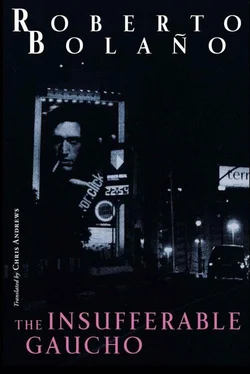After a while I came to the dead sewer. Sewers in which the water is stagnant are all pretty much the same, but I can usually tell, with a fair degree of certainty, whether or not I’ve been in a particular dead sewer before. That one was unfamiliar. I examined the entrance for a while, looking for a dry way in. Then I jumped into the water and swam. As I drew closer I thought I could see waves coming from an island of detritus. Naturally, I was worried about running into a snake, and I swam toward the island as quickly as I could. The ground there was soft; I sunk into a whitish mud up to my knees. The smell was the same as in all the dead sewers, not decomposing matter so much as the inner essence of decomposition. I made my way slowly from island to island. Occasionally I had the impression that something was clutching at my feet, but it was only trash. On the last island I found the bodies. There was only one wound on young Eustaquio’s body: his throat was torn open. It was clear that young Marisa, however, had put up a fight. Her skin was covered with bites. I found blood on her teeth and claws, from which it was simple to deduce that the killer had been wounded. I struggled with the bodies one at a time, and finally got them out of the sewer. Then I tried to transport them to the nearest settlement, carrying one for fifty yards, putting it down, going back for the other. At one point, as I was going back for young Marisa’s body, I saw a white snake that had come out of the canal and was heading toward her. I froze. The snake wrapped itself twice around her body, then crushed it. When it began to swallow her, I turned and ran to where I’d left Eustaquio. I wanted to scream. But I didn’t even let out a whimper.
From that day on, I intensified my investigations. I was no longer satisfied with routine police work: patrolling the perimeter and dealing with problems that anyone with a modicum of common sense could solve. Every day I went out to the furthest burrows. I engaged their inhabitants in the most trivial conversations. I discovered a colony of rat-moles living among us, performing the lowliest tasks. I met an old white mouse, a white mouse who couldn’t remember his age. In his youth he had been inoculated with a contagious disease, along with many of his kind, white mice who had been imprisoned and then released into the sewers in the hope of killing us all. Many died, said the white mouse, who could barely move, but the black rats and the white mice interbred, we fucked like crazy (as only those who are close to death can fuck) and in the end not only did the black rats become immune, but a new species also emerged: brown rats, resistant to any infection, any alien virus.
I liked that old white mouse who was born, so he said, in a laboratory on the surface. The light is blinding up there, he said, so bright that the surface dwellers don’t even appreciate it. Have you been to the sewer mouths, Pepe? Yes, once or twice, I replied. So you’ve seen the river that the sewers all flow into, you’ve seen the reeds, the pale sand? Yes, but always at night, I replied. So you’ve seen the moonlight shimmering on the river? I didn’t really notice the moonlight. What did you notice, then, Pepe? The barking of the dogs, the packs of dogs that live by the river. The moonlight too, I admitted, but I couldn’t really enjoy the view. The moon is exquisite, said the white mouse; if someone were to ask me where I’d like to live, I would reply without hesitation: the moon.
Like a moon-dweller I patrolled the sewers and underground drains. After a while I found another victim. As before, the killer had left the body in a dead sewer. I picked it up and carried it to the station. That night I spoke with the coroner again. I pointed out the similarity between the tear in the throat and the other victims’ wounds. It could be a coincidence, he said. And whatever’s doing this doesn’t eat them, I said. The coroner examined the body. Look at the wound, I said. Tell me what kind of teeth rip the skin like that. Any kind, any kind, said the coroner. No, not any kind, look carefully. What do you want me to say? said the coroner. The truth, I said. And what is the truth, in your opinion? I think these wounds were made by a rat, I said. But rats don’t kill rats, said the coroner, looking at the body again. This one does, I said. Then I went to work and when I returned to the station I found the coroner and the chief commissioner waiting for me. The commissioner didn’t beat around the bush. He asked me where I’d got the crazy idea that a rat had been responsible for the crimes. He wanted to know if I had shared my suspicions with anyone else. He warned me not to. Stop fantasizing, Pepe, he said, and concentrate on doing your job. Real life is complicated enough without inventing unreal things that are bound to throw it out of joint. I was dead tired; I asked him what he meant by out of joint . I mean, said the commissioner, looking at the coroner as if to seek his approval and adopting a deep and gentle tone of voice, that in life, especially if it’s short, as our lives unfortunately are, we should strive for order, not disorder, and especially not an imaginary disorder. The coroner looked at me gravely and nodded. I nodded too.
But I remained alert. For several days the killer seemed to have disappeared. Every time I went to the perimeter and made contact with a new colony, I asked about the first victim, the baby who had died of hunger. Finally an old explorer told me about a mother who had lost her baby. They thought it had fallen into the canal or been taken by a predator. But since there were many children in that group and only a few adults, they didn’t spend a long time looking for the baby. Shortly afterward, they moved to the northern sewers, near a big well, and the explorer lost touch with them. When I had some time to spare, I went looking for that group. I knew they would have multiplied since the baby’s disappearance; the children would have grown up, and perhaps they would have forgotten. But if I was lucky enough to find the baby’s mother, she would still be able to tell me something. The killer, meanwhile, was on the loose. One night I found a body in the morgue with the killer’s signature wound: the throat was torn open, almost neatly. I spoke with the police officer who had found the body. I asked him if he thought it had been a predator. What else could it be? he said. You think it was an accident, do you, Pepe? An accident, I thought. A permanent accident. I asked him where he had found the body. In a dead sewer down south, he replied. I suggested that he keep an eye on the dead sewers in that sector. Why? he wanted to know. Because you never know what you’ll find there. He looked at me as if I were crazy. You’re tired, he said, let’s get some sleep. We went to the station’s sleeping room. The air was warm. Another police rat was snoring in there. Good night, said my colleague. Good night, I said, but I couldn’t sleep. I started thinking about the killer’s movements, the way he sometimes struck in the north and sometimes in the south. After tossing and turning for a while I got up.
I headed north, stumbling along. On the way I came across some rats who were setting off to work in the dim
tunnels; they were confident and resolute. I heard some youngsters saying, Pepe the Cop, Pepe the Cop, then laughing, as if my nickname were the funniest joke in the world. Or maybe they were laughing for some other reason. In any case I didn’t stop.
Gradually the tunnels were all deserted. Only now and then did I encounter a pair of rats or hear them going about their business down other tunnels, or glimpse their shadows huddled around something that could have been food, or poison. After a while, the noises stopped and I could hear only the sound of my heart and the dripping that never ceases in our world. When I came to the big well, the reek of death made me tread even more warily. Half consumed by maggots, the carcasses of two average-size dogs lay there, rigid, paws sticking up.
Читать дальше












